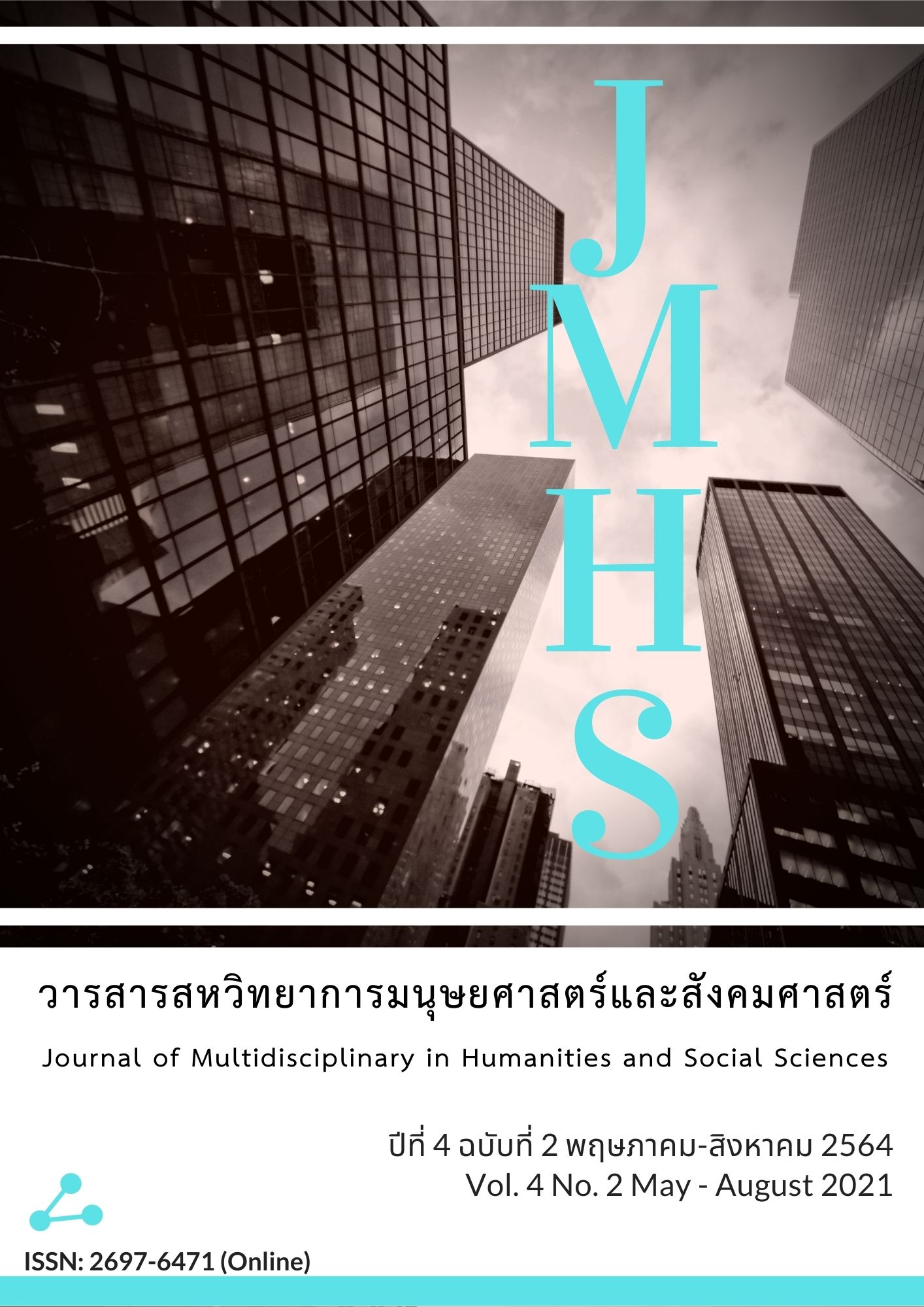Community Involvement in Sustainable Management: Case Studies of Fresh Market Waste Management Model New Happyland, Bueng Kum District, Bangkok
Main Article Content
Abstract
The objectives of this research were as follows: 1) to study the level of community participation in sustainable management in the New Happyland Fresh Market community, Bueng Kum District, Bangkok; 2) to compare the community participation in sustainable management in the new Happyland Fresh Market community, Bueng Kum District, Bangkok. Classified by personal factors; and 3) to propose a community waste management approach to the new Happyland Fresh Market, Bueng Kum District, Bangkok. This study was a quantitative research. Collected the data from 189 stalls of 189 new Happyland market vendors and analyzed the data by finding the mean and standard deviation. As well as proving the research hypothesis. It was found that
Participation in Solid Waste Management of People in the New Happyland Fresh Market Community, Bueng Kum District, Bangkok. Overall, the mean was at a moderate level (= 2.60), the highest level of participation was participation in planning (
= 2.82), participation in activities (
= 2.73), participation in monitoring and evaluation (
= 2.62), and the one with the lowest level of participation was participation in solid waste utilization (
= 2.39). And a study comparing the community participation in sustainable management in the new Happyland Fresh Market community found that the personal factors did not differ at a significant level of 0.05. The new Happyland Fresh Market community waste management approach should promote the role of marketing manager in waste management. There is a development of waste management technology to suit the market space limitations. Promoting waste management within merchants' markets Creating a manual for waste sorting within the marketplace, including promoting the sorting of waste to merchants in different channels. There is an incentive for traders to sort out their waste within the market. And organizing the market area into the same category according to Product types to facilitate the collection and sorting of waste within the market.
Article Details
Views and opinions appearing in the Journal it is the responsibility of the author of the article, and does not constitute the view and responsibility of the editorial team.
References
กรมควบคุมมลพิษ. (2555). แผนการจัดการมลพิษ พ.ศ. 2555-2559. กรุงเทพฯ: กองแผนงานและประเมินผลกรมควบคุมมลพิษ.
จิรวรรณ คุ้มพร้อม สาลีพันธุ์. (2560). การพัฒนาการบริหารจัดการขยะที่เป็นส่วนหนึ่งของการศึกษาเชิงท่องเที่ยวอย่างยั่งยืน สำหรับโรงเรียนประถมศึกษาในอำเภอเกาะสมุย โดยใช้การสอนแบบทีม. วารสารวิชาการ บัณฑิตวิทยาลัยสวนดุสิต, 13(2), 15 – 27.
ธนวัฒน์ คำภีลานนท์. (2550). การมีส่วนร่วมของกรรมการชุมชนในการพัฒนาท้องถิ่น เทศบาลเมืองคูคต จังหวัดปทุมธานี(วิทยานิพนธ์รัฐประศาสนศาสตรมหาบัณฑิต). มหาวิทยาลัยราชภัฏพระนคร.
ทรงธิศักดิ์ ทิพย์คา. (2555). การมีส่วนร่วมของประชาชนในการจัดการขยะ ตำบลบ้านสาง อำเภอเมือง จังหวัดพะเยา(วิทยานิพนธ์รัฐประศาสนศาสตรมหาบัณฑิต). มหาวิทยาลัยพะเยา.
ทานตะวัน อินทร์จันทร์. (2546). การมีส่วนร่วมของคณะกรรมการชุมชนในการพัฒนาชุมชนย่อยในเขตเทศบาลเมืองลำพูน(การค้นคว้าอิสระรัฐประศาสนศาสตรมหาบัณฑิต). มหาวิทยาลัยเชียงใหม่.
ปรีดา เจษฎาวรางกูล. (2550). การมีส่วนร่วมของกรรมการชุมชนในการพัฒนาชุมชนในเขตเทศบาลเมืองคูคต อำเภอลำลูกกา จังหวัดปทุมธานี(การศึกษาอิสระรัฐประศาสนศาสตรมหาบัณฑิต). มหาวิทยาลัยขอนแก่น.
พิชิต อินโองการ. (2555). การศึกษาแนวทางการจัดการขยะมูลฝอยชุมชนที่เหมาะสมโดยใช้การวิเคราะห์การไหลของวัสดุ: กรณีศึกษาองค์การบริหารส่วนตำบลร่มเย็น อำเภอเชียงคำ จังหวัดพะเยา(วิทยานิพนธ์วิทยาศาสตรมหาบัณฑิต). มหาวิทยาลัยพะเยา.
เสนาะ แก้วคง. (2560). การมีส่วนร่วมของประชาชนในการจัดการขยะมูลฝอยภาคครัวเรือนในเขตเทศบาลตำบลบางวัวคณารักษ์ อำเภอบางปะกง จังหวัดฉะเชิงเทรา(วิทยานิพนธ์รัฐศาสตรมหาบัณฑิต). มหาวิทยาลัยบูรพา.
อคิน รพีพัฒน์ (2531).ปัญหาการพัฒนาชนบท บทเรียนจากกรณียกกระบัตรโครงการพัฒนาชนบทลุ่มน้ำแม่กลอง. ขอนแก่น: สถาบันวิจัยและพัฒนามหาวิทยาลัยขอนแก่น.
อาณัติ ต๊ะปินตา. (2553). ความรู้เบื้องต้นเกี่ยวกับการจัดการขยะมูลฝอย. กรุงเทพฯ: จุฬาลงกรณ์มหาวิทยาลัย.
Cohen, J. M., & Uphoff, N. (1980). Participation’s Place in Rural Development: Seeking Clarity Through Specificity. World Developments, 8(3), 213-235.
Erwin, W. (1976). Participation Management: Concept Theory and Implementation. Atlanta G.: Georgia State University.
Lisk, F. (1985). Popular Participation in Planning for Basic Needs: Concepts, Methods and Practices. Aldershot: Gower.


